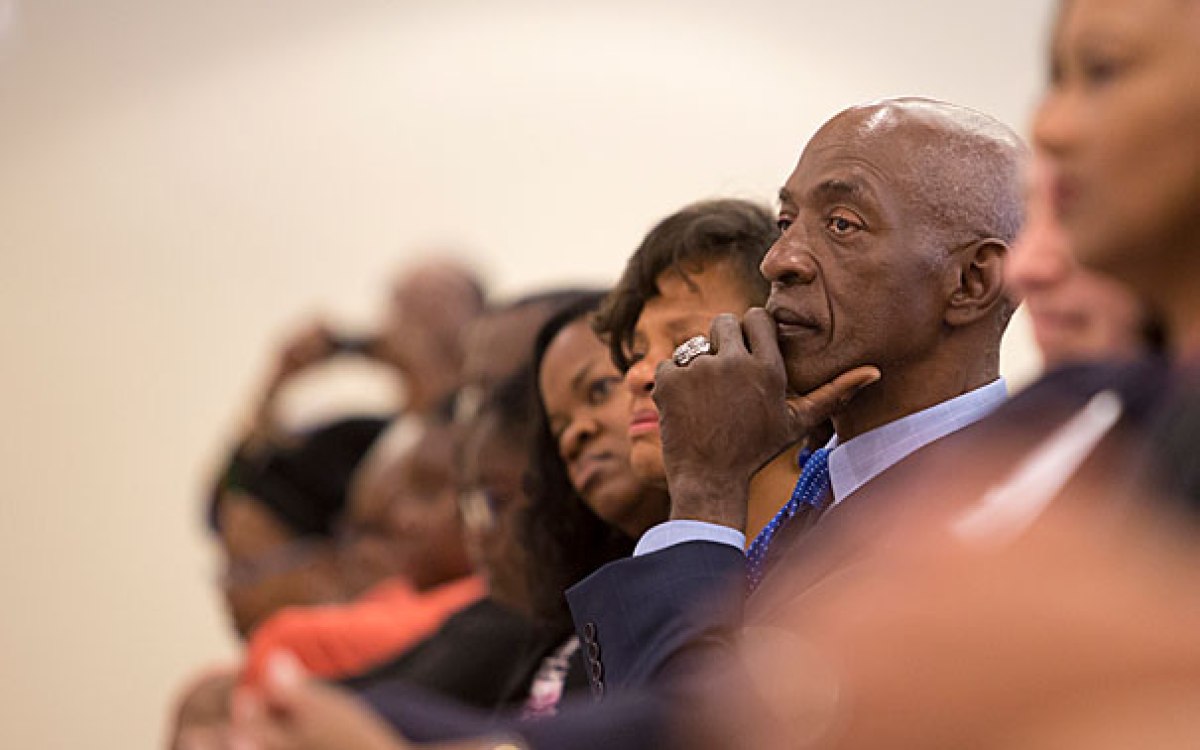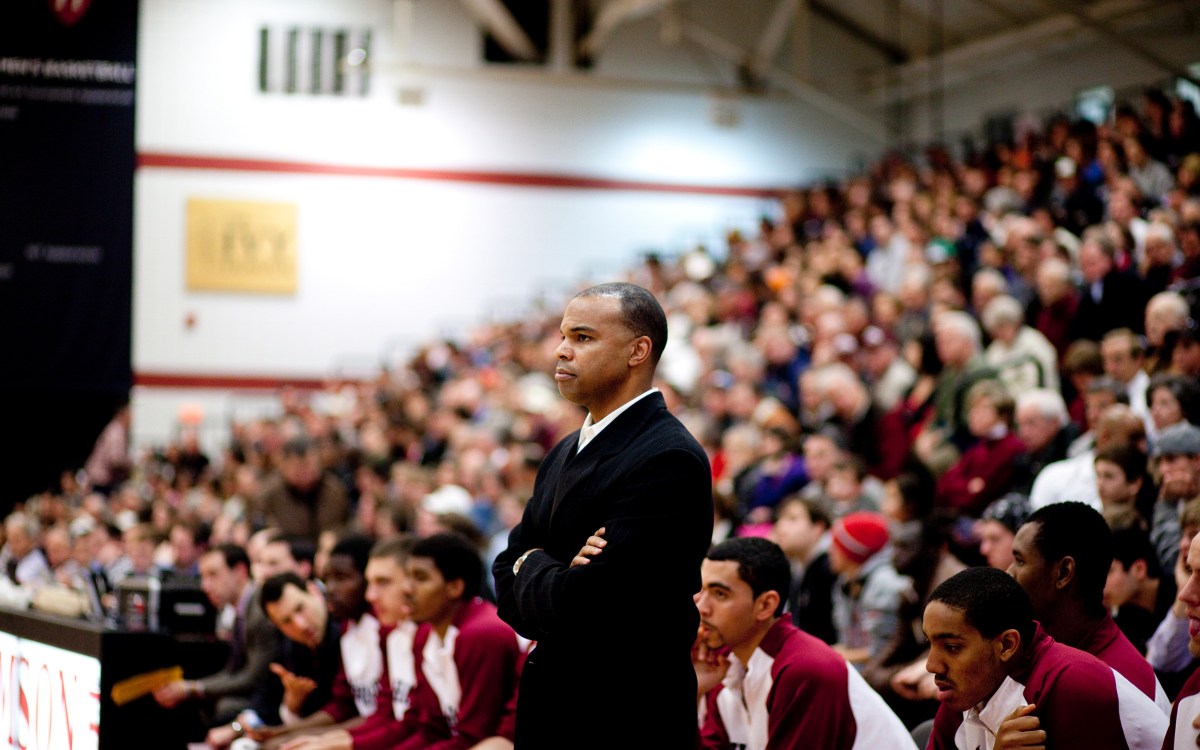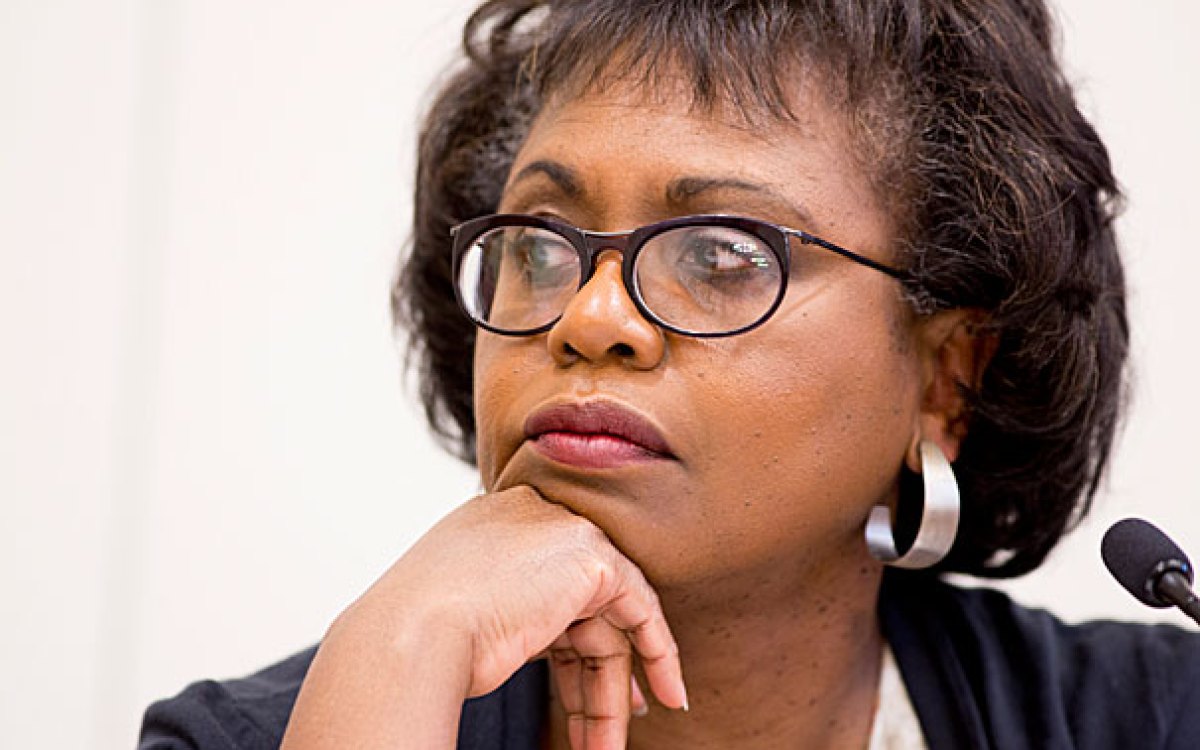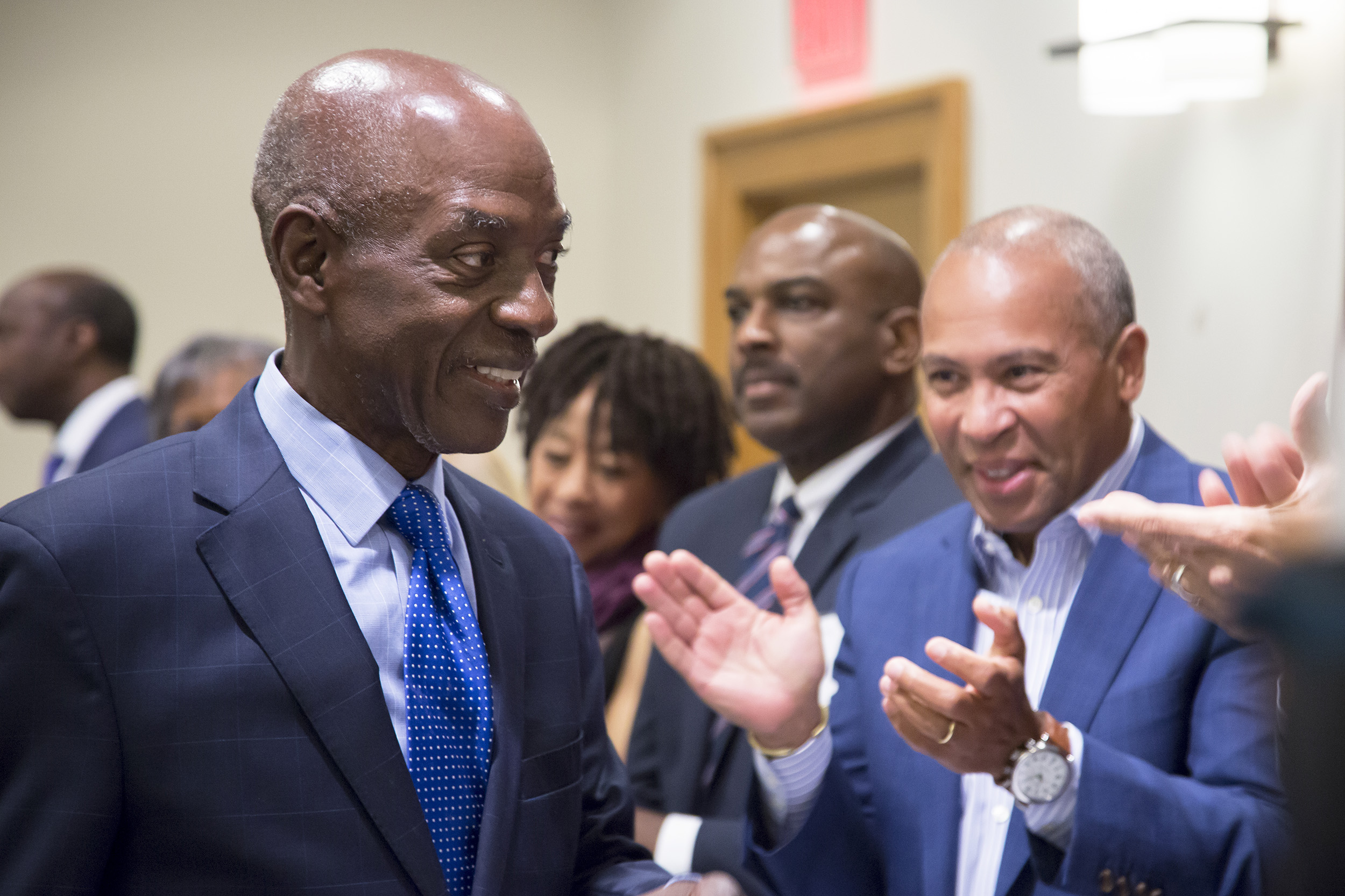
Charles J. Ogletree Jr. greets friends, former students, colleagues, and well-wishers at a 2017 celebration of his legacy and career.
Harvard file photo
How they remember ‘Tree’
Civil rights scholar, legendary public defender, voice for equality, yes, but friends, colleagues also recall kindness, generosity, sweet-potato pie
A beloved Harvard Law professor. An early champion for slavery reparations. A voice for gender equality. A legendary public defender. A civil rights scholar. A lawyer for indigent clients. A lead counsel for Anita Hill during her testimony accusing U.S. Supreme Court nominee Clarence Thomas of sexual harassment. A mentor to Michelle Robinson Obama ’88, Barack Obama ’91, and to hundreds of other African American lawyers.
These are among the many tributes to Harvard Law Professor Charles J. Ogletree Jr. ’78, affectionately known as “Tree,” that have been echoing across campus and in capitols, city halls, courthouses, and private conversations around the nation this week. Ogletree taught at Harvard Law School since 1984 and retired in 2020 after a diagnosis of early onset of Alzheimer’s disease. He died last Friday at age 70.
During his time at the Law School, Ogletree founded the Charles Hamilton Houston Institute for Race & Justice and the Criminal Justice Institute at Harvard Law School, and ran an informal “Saturday School,” where he mentored law students. We asked friends and colleagues in the Harvard community to reflect on how he will be remembered — and how they remember him.
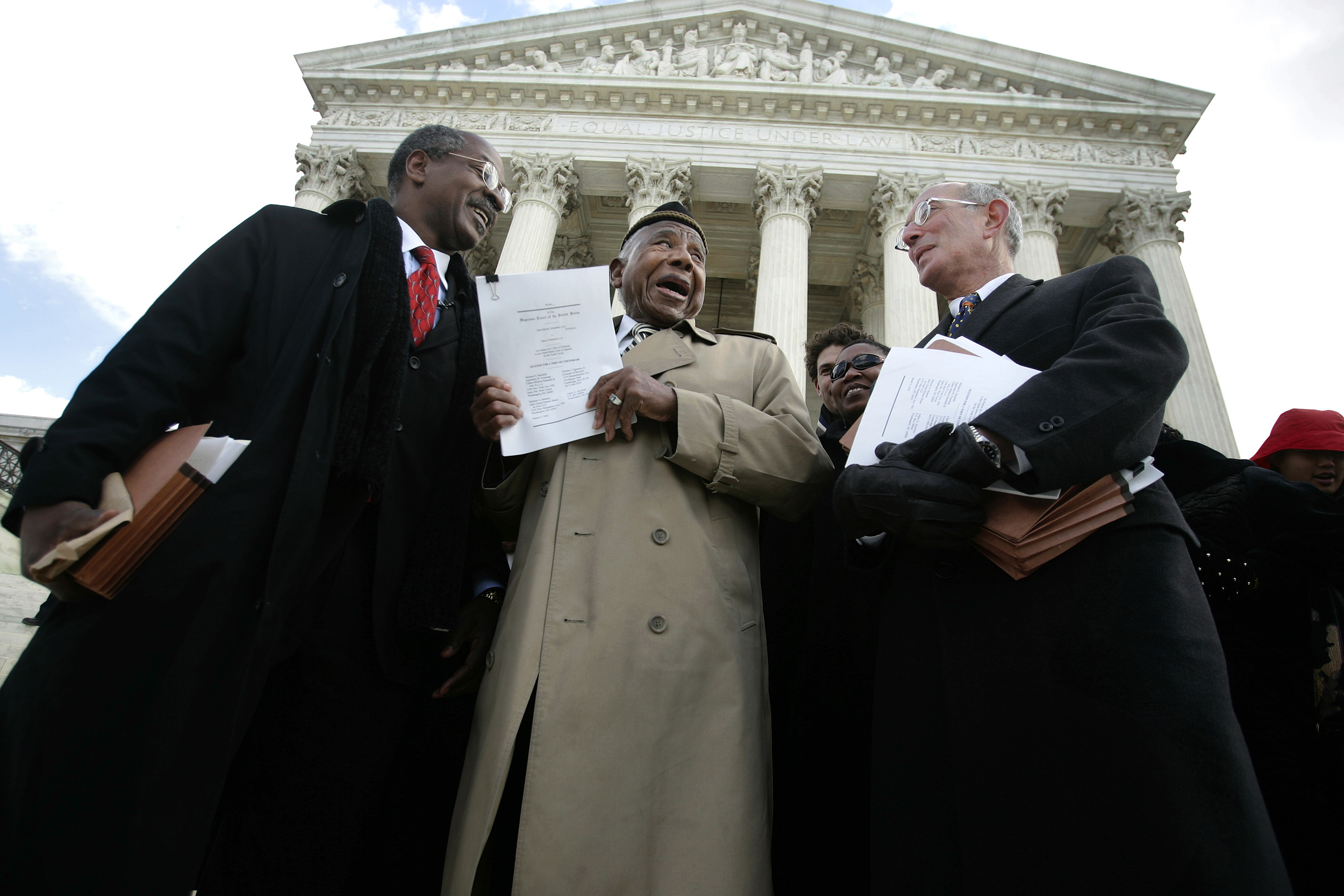
Ogletree (left) represented survivors of the 1921 Tulsa race massacre, including Otis Clarke (center).
Gerald Herbert/AP
“Tree had everyone’s backs; he saw the potential in everyone and sought to nurture it.”
Tomiko Brown-Nagin, Dean, Radcliffe Institute for Advanced Study at Harvard, Daniel P.S. Paul Professor of Constitutional Law, Harvard Law School
Charles Ogletree’s legacy is broad and deep, and there are many ways to characterize it. One can point to numerous professional achievements: acclaimed criminal defense lawyer, impassioned advocate of racial justice, visionary founder of both Harvard Law School’s Criminal Justice Institute and the Charles Hamilton Houston Institute.
A devotion to building and sustaining community ran through these accomplishments, and I deeply appreciate this dimension of his legacy. Tree did not live only for himself. He gave of himself — his considerable intellect, his indefatigable energy, his generosity of spirit and empathetic personality — to fortify others. Tree had everyone’s backs; he saw the potential in everyone and sought to nurture it. The benefits of his commitment flowed, in particular, to Black Harvard students, many of whom, like Tree himself, the son of California tenant farmers, began life with many disadvantages. Hence, he mentored law students through Saturday School and invited his colleagues to join him. He taught leadership skills to student athletes through convenings of The Breakfast Club, alongside coach [Tommy] Amaker and Ron Sullivan.
A pathbreaking member of the Harvard Law School faculty, he welcomed all who followed him. He took a particular interest in Black faculty; Tree made a point of inviting us to gather and connect over food and drink. I will never forget the warmth with which he greeted me when I joined the Law School faculty some 11 years ago; his smile crinkled the corners of his shining eyes. It is fitting that an endowed chair at Harvard Law School now bears his name; he deserves to be remembered and celebrated. May we all learn from Tree’s legacy of professional success, animated by service, and coupled with humility.
“[T]hat will be his greatest legacy — his impact on others.”
Tommy Amaker, The Thomas G. Stemberg ’71 Family Endowed Coach for Harvard Men’s Basketball
You come across certain people in your life’s journey who leave an indelible mark. I was incredibly fortunate and blessed to have that happen with Harvard Law Professor Charles Ogletree. Tree and I became friends when I arrived at Harvard at a pivotal moment in my life. He did with me what he did with so many: make me bigger and better than I could imagine. Because of my relationship with Tree and his commitment to selfless service to others, I have always felt an obligation and a debt to “pay it forward” and to make him proud by bringing inspiration and opportunity to others. Among his many accomplishments, that will be his greatest legacy — his impact on others. We all owe him.
“Every year, Tree contributed two of his famous home-baked sweet-potato pies, which always elicited boisterous and competitive bidding.”
Carol S. Steiker, J.D. ’86, Henry J. Friendly Professor of Law, Special Advisor for Public Service, Harvard Law School
Tree came to HLS while I was a law student there in the mid-1980s. I came to Law School sure that I wanted to be a law professor, but not sure what my specialty would be. At HLS, I began to be interested in criminal law and possibly public defense. Tree was the first person who told me about the D.C. Public Defender Service (PDS), where he had been a legendary trial attorney and eventually deputy director. He was a towering figure in the public defense community and a wonderful ambassador for that important work.
With Tree’s encouragement, I applied to PDS after my clerkships and worked there for four years before returning to HLS as an assistant professor of criminal law and procedure. My career’s trajectory was deeply marked by Tree, and I — like many, many others — am so grateful for his example and encouragement.
At HLS, there was a tradition starting in the 1990s and lasting for more than a decade of having an auction to raise money for students doing public-interest work. (This was before the Law School guaranteed summer public-interest funding for all students and funded the Public Service Venture Fund for postgraduate public interest work.). For the first seven years of the auction, Tree and I served as co-auctioneers. I marveled at the way he effortlessly and charismatically commanded the Ames Courtroom (where the auction was held). I can still see him in my mind’s eye, dressed in his tux, joking, and getting people to bid higher and higher until late in the evening. Every year, Tree contributed two of his famous home-baked sweet-potato pies, which always elicited boisterous and competitive bidding.
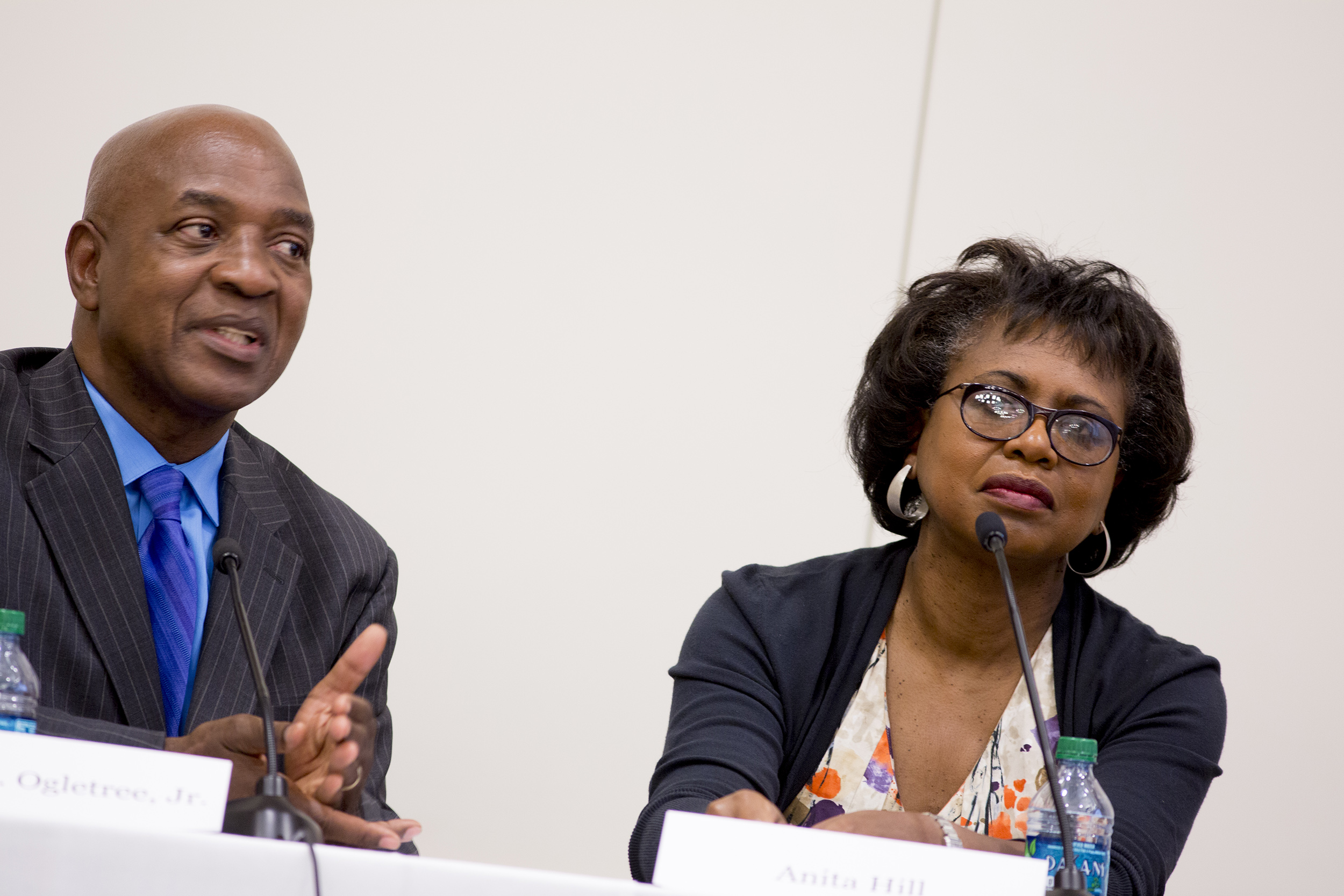
Ogletree with former client Anita Hill at a Harvard talk in 2014.
Harvard file photo
“Ogletree stood at the side of Anita Hill at a moment in American legal history when women were categorically disbelieved, and men were categorically believed.”
Cornell William Brooks, Professor of the Practice of Public Leadership and Social Justice and director of the William Monroe Trotter Collaborative for Social Justice, Harvard Kennedy School
Charles Ogletree will certainly be remembered not only by his students, or a generation of lawyers who have been mentored and inspired by him, but also by people across the country who knew that there was a lawyer and a professor at Harvard Law School who took the side of David against a series of Goliaths.
Let’s remember that when the Clarence Thomas’ confirmation hearings took place in 1991, sexual harassment law was in its infancy. Ogletree stood at the side of Anita Hill at a moment in American legal history when women were categorically disbelieved, and men were categorically believed. For Ogletree to stand beside her in that politically and legally perilous moment was a window into his character. It took a certain measure of courage to stand at her side at that moment.
Just like when he spoke up for slavery reparations. Reparations are incredibly contested and controversial in the present moment. Go back a generation and there was Charles Ogletree standing at the side of Black people who were terrorized, slaughtered, and bombed in Tulsa, Oklahoma, in 1921. We have yet to hear from the House, the Senate, even the president of the United States, speak definitively on reparations. Ogletree did that years ago [in 2003]. It takes a certain amount of courage to listen to people who were terrorized in 1921 and make legal claims for reparations. Ogletree represented a rare combination of practice, scholarship, teaching, and mentorship. I would argue that those are the four pillars of a legal giant.
I’m a civil rights lawyer, but I’m also a fourth-generation ordained minister in the African Methodist Episcopal Church. I’ve had the occasion of preaching a great many funerals and doing eulogies. One of the things that I think is important in moments like this is that as much as we grieve, we should also be inspired. As much as we, in moments of loss, need comfort, we should also welcome challenge. With his passing, a great many people have suffered: his students, his mentees, his friends, most certainly his family. But the loss of Charles Ogletree’s life not only demands comfort, but also challenges us to live as he did. It’s not merely that we grieve. It’s also that we challenge ourselves to learn the lessons that he left.
“He would stop and talk to you for 20 minutes, or sometimes hours, even though large matters competed for his attention.”
Kenneth Mack, J.D. ’91 , Lawrence D. Biele Professor of Law
Charles always had time for you. That was true whether you were a law student, a criminal defense client, a person from the community who came to his Saturday School program, a Black woman testifying before Congress in a controversial Supreme Court nomination, or a former student campaigning to be president of the United States. He would stop and talk to you for 20 minutes, or sometimes hours, even though large matters competed for his attention.
His fingerprints were all over the 2003 Grutter decision, where the Supreme Court upheld the consideration of race in university admissions. One of my Law School colleagues once told me that Charles was “the busiest person on the planet.” If you needed help, he would give you as much time as you needed. He saw himself as carrying forward the work of predecessors such as Charles Hamilton Houston, Thurgood Marshall, Constance Baker Motley, and Derrick Bell, whom he revered.
When I arrived at Harvard Law School as a student in 1988, Charles wasn’t on the tenure track yet, but he was already an institution to himself. It seemed as though every student knew him or knew of him. He knew all of them as well. Years later, he could remember the names and backgrounds of hundreds and hundreds of students. They were as much his legacy as anything else.
“He radiated inspiration.”
Randall Kennedy, Michael R. Klein Professor of Law
Charles Ogletree leaves behind memories of an energetic, innovative, thoughtful, and generous lawyer, teacher, activist, and scholar. He radiated inspiration, elicited respect, and prompted admiration. He was beloved by many who were fortunate enough to come under his sway. Seldom has a law professor generated such a deep sense of gratitude.
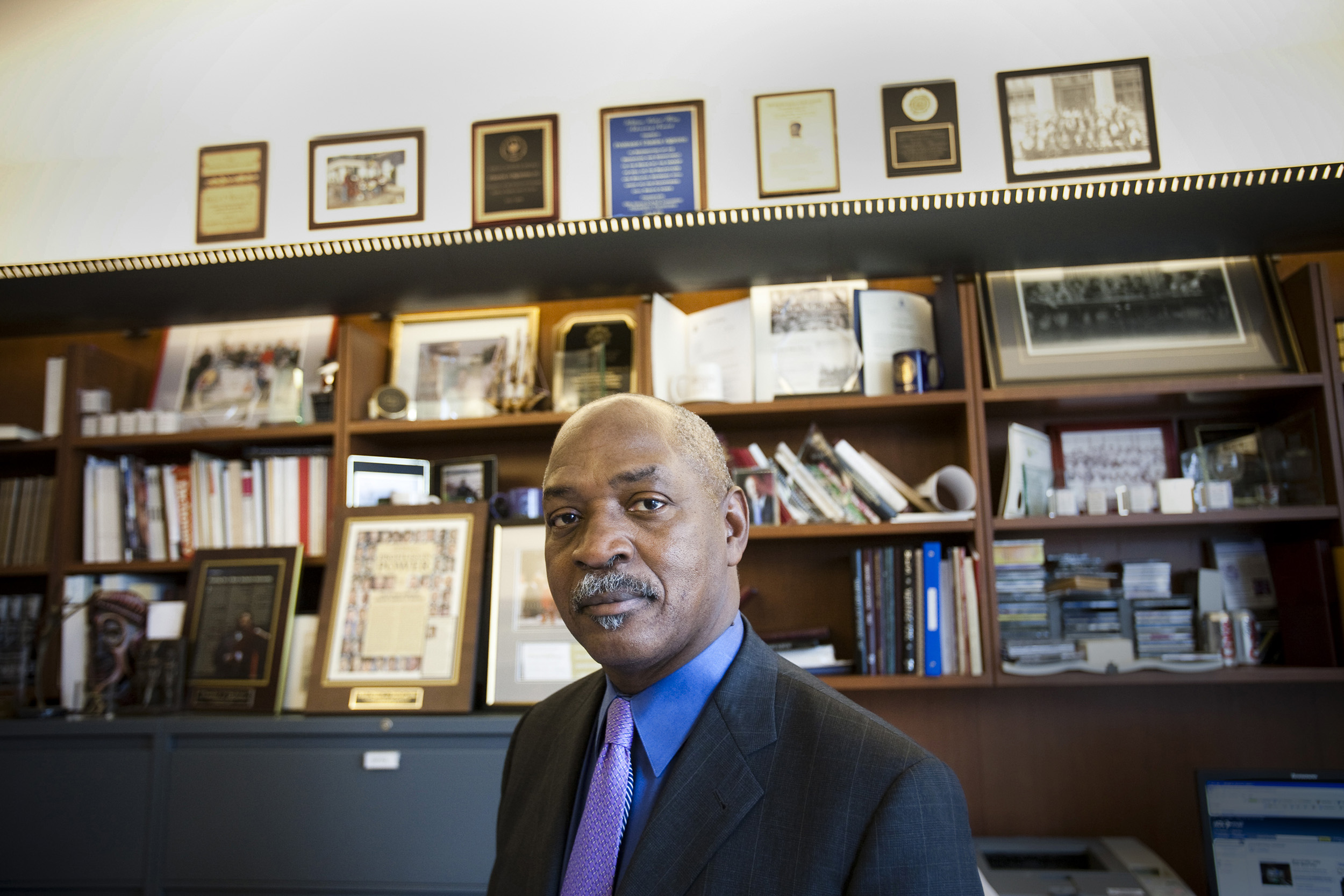
Ogletree in his Hauser Hall office in 2009.
File photo by Stephanie Mitchell/Harvard Staff Photographer
“To be a fierce advocate for justice speaking up about wrongs, and at the same time make friends so easily.”
Rosabeth Moss Kanter, Arbuckle Professor, Harvard Business School, founding chair and director, Harvard University Advanced Leadership Initiative (2005-2018)
Charles Ogletree’s legacy is the multitudes of people he enlightened, inspired, and empowered. I became closer to him after a chance encounter on an airplane in 2006 led me to invite him as to one of the first faculty co-chairs of the still-being-created, Harvard University-wide Advanced Leadership Initiative (ALI). He enthusiastically jumped in to ensure that ALI attract diverse top leaders interested in societal improvement and social justice.
A great collaborator, he taught with me, and we co-wrote an HBS case on Civil Rights leader Benjamin Hooks, who started late in life a children’s health project to reduce lead poisoning. Tree tapped a vast network of contacts for major events, such as our first deep dive on poverty, justice, and jobs, held at Harvard Law School. He could reach top leaders instantly on his ubiquitous cellphone, while cherishing the many incoming Black students he invited in the fall to a Martha’s Vineyard retreat. He ran an annual Vineyard forum to which hundreds flew in; one memorable event featured survivors of the Tulsa race massacres, including some who were nearly 100 years old, whom Tree treated with the utmost dignity.
He held supplemental office hours weekly over lunch at Changsho [a Chinese restaurant on Mass Avenue] across from HLS, with rotating shifts of local civic leaders, students, and faculty. Always curious, he traveled with ALI fellows and faculty to India and China, Miami, and Detroit. He was a tough advocate for justice and always a gracious friend to people of all colors. He was not just admired; he was deeply loved.
Professor Charles Ogletree’s personal email address was “nochuck.” Known always by the nickname Tree, and decidedly not Chuck, he knew how he wanted to be treated, and he accorded others the same respect and dignity.
I recall walking into his house on Martha’s Vineyard one summer and meeting the Cambridge police chief, with whom he had struck an agreement and a friendship after the police mistakenly arrested Professor Henry Louis “Skip” Gates for seeming to break into his own house. (Skip immediately retained Tree as his lawyer.) The whole episode revealed Tree’s character. To be a fierce advocate for justice speaking up about wrongs, and at the same time make friends so easily.
“Rest now, my friend. Your legacy lives on.”
Ron S. Sullivan Jr., J.D. ’94, Jesse Climenko Clinical Professor of Law and faculty director of the Criminal Justice Institute at Harvard Law School
Professor Ogletree’s legacy lies in the many students he has mentored over the years. He was the Charles Hamilton Houston of his generation, equipping an army of lawyers to fight for the disenfranchised.
Tree, as he was affectionately called by nearly everyone, took his role as teacher and mentor seriously by sharing his tremendous advocacy gifts with generations of students and challenging them to go about the work of social justice. Indeed, one of Tree’s favorite quotes — not surprisingly — comes from Charles Houston: “A lawyer is either a social engineer or a parasite on society.”
By word and deed, Tree dedicated his life to using his unique skill set to aid those in distress, to advocate for those without voice, and to demand the construction of fair and equitable laws applied, without favor, to all.
Even though Tree came to know presidents and the powerful over the course of his career, his advocacy for the powerless never waned. Nor did his energy. Tree’s desire to forcibly bend the arc of the moral universe toward justice gave him purpose. His many students gave him hope. Rest now, my friend. Your legacy lives on.



